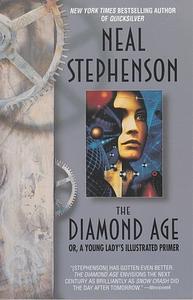You need to sign in or sign up before continuing.
Take a photo of a barcode or cover
I'd give this 5 stars, but the ending just wasn't there for me. It took me a while to get into this one. In fact, I started about 4 other times previously before finally breaking the barrier this time into a place that caught me. I really enjoy interesting world building in a book, and this one has that in spades. Some of the technology went over my head, but I felt like the concepts were repeated often enough that it sunk in without being annoying. I find myself desperately wanting a Primer of my own, and Nell was a fantastic character. Most of the other story lines running through the book, while obviously related, seemed unnecessary though. Sort of like Stephenson realized he might be writing a YA book and so threw in some other characters to spice it up.
Absolutely amazing, stunningly brilliant, If you're a fan of post-cyberpunk sci-fi then this book is a must read for you.
This book is very creative; but I thought the depictions of Chinese people were racist, and the sex cult is kinda gross in many ways. There are a couple rapes that don't even contribute to the plot, and overall it's pretty goofy. But I did enjoy reading it.
This book started off great, but then I ceased to enjoy it much at all for the last 100 pages. There was one chapter so bad that even though I only had about 80 pages left I debated not finishing it.
I enjoyed it, although it was a little in need of an editor, and his vocabulary was definitely pretentious. (Palimpsests? Really?) It was an interesting concept, though, and made me hopeful about Cryptonomincon which is currently sitting in the living room on the table.
Made it about 3/4 of the way through, could see this thing was going off the rails, then DNF. Did not care for the low-grade racism & sexism throughout the book because the book made no effort to examine said bigotries. Just employed some tropes uncritically.
How do you follow up one of the seminal cyberpunk novels of the age? By writing a futuristic story that features a talking duck, dinosaur, rabbit and doll. Stephenson crafts a world even stranger than Snow Crash (though possessing the same lack of geographic states boundaries) where nanotech is the key to life. But it's more than some cyberpunk dream, it's ultimately that rare female coming of age story that could fit right in alongside the boy's, relationships are out, knowledge is in for our heroine, Nell. It falls a little flat towards the end but the world is deep and rich enough, the characters engaging enough to be well worth the trip.
I love this book because many other novel involve nanotechnology, but treat it vaguely like magic - "oh yes, they have nanotechnology so they teleported through the enemy territory." Stephenson obviously took a long time to figure out the social and cultural shifts that nanotechnology would provide, and how society could stabilize given such a ridiculously dangerous technology. It really makes you think.
It's also a great imaginative book. Reminds me a bit of the Neuromancer trilogy, but it's post-cyberpunk so everything is a lot more optimistic. Watching the main character grow up reading her Illustrated Primer occasionally brough tears to my eyes. It's a great story about childhood too.
It's also a great imaginative book. Reminds me a bit of the Neuromancer trilogy, but it's post-cyberpunk so everything is a lot more optimistic. Watching the main character grow up reading her Illustrated Primer occasionally brough tears to my eyes. It's a great story about childhood too.
Re-read for I believe the third time. I used to think this was one of my absolutely favorite sci-fi novels. May still be one of my top-five or top-ten, but my thoughts are considerably more mixed after this reading. I still love the world that Stephenson built here and have nothing but questions about how his world came to be, how some of the other phyles function, etc. I cannot complain about his world building. For that matter, I also love the bildungsroman that is the heart of the novel - Stephenson's attempt to answer the puzzle posed in the novel, namely how can a society propagate its values in a way that its children use their reason to see why its values are appropriate rather than just enforcing them by rote. Not that I'm satisfied that technological wizardry could truly provide the answer (Stephenson anticipated some US education reformers in this regard).
My problem is Stephenson's heralding culture as the answer, not least because I'm not convinced that he manages to disentangle culture from race and ethnicity. Despite some hand waving that suggests that the Neo-Victorians are open to anyone that accepts their values, I'm not convinced that it's anything more than a stand-in for white Anglo-Saxon culture. Meanwhile, his "Han" phyle refers to an ethnic category, not a cultural one. Not sure whether this link was deliberate, but it does seem as if Stephenson was taking Samuel Huntington's "Clash of Civilizations" thesis to its logical conclusion. Except that like Huntington, Stephenson struggles to show how culture is independent from other categories. This entanglement is particularly challenging when discussing Chinese culture, since it has at times emphasized the universality of Chinese culture and at other times veered to Han chauvinism. Meanwhile, his dismissal of the long-term viability of the state leads him to miss the key point that the state - especially in China and Japan - has often played a central role as the upholder, articulator, and defender of culture, particularly through the education system.
Anyway, it's possible that Stephenson wasn't making definitive statements on any of these questions and believes that everything is up for grabs, but I doubt it.
Oh - and I had previously argued with econoblogger Noah Smith about the Boxer Rebellion ending. I've come around to his view: it's lame and unnecessary.
My problem is Stephenson's heralding culture as the answer, not least because I'm not convinced that he manages to disentangle culture from race and ethnicity. Despite some hand waving that suggests that the Neo-Victorians are open to anyone that accepts their values, I'm not convinced that it's anything more than a stand-in for white Anglo-Saxon culture. Meanwhile, his "Han" phyle refers to an ethnic category, not a cultural one. Not sure whether this link was deliberate, but it does seem as if Stephenson was taking Samuel Huntington's "Clash of Civilizations" thesis to its logical conclusion. Except that like Huntington, Stephenson struggles to show how culture is independent from other categories. This entanglement is particularly challenging when discussing Chinese culture, since it has at times emphasized the universality of Chinese culture and at other times veered to Han chauvinism. Meanwhile, his dismissal of the long-term viability of the state leads him to miss the key point that the state - especially in China and Japan - has often played a central role as the upholder, articulator, and defender of culture, particularly through the education system.
Anyway, it's possible that Stephenson wasn't making definitive statements on any of these questions and believes that everything is up for grabs, but I doubt it.
Oh - and I had previously argued with econoblogger Noah Smith about the Boxer Rebellion ending. I've come around to his view: it's lame and unnecessary.
http://fantastiskfiktion.wordpress.com/2010/09/13/snow-crash-och-the-diamond-age/




